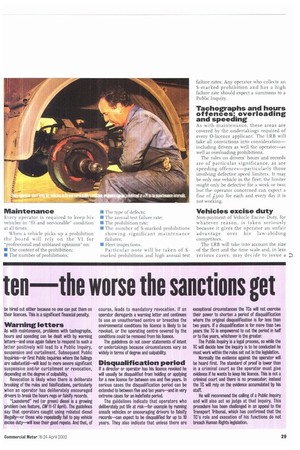ten the worse the sanctions get
Page 29

If you've noticed an error in this article please click here to report it so we can fix it.
be hired out either because no one can put them on their licences. This is a significant financial penalty.
Warning letters
As with maintenance, problems with tachographs, hours and speeding can be dealt with by warning letters—and once again failure to respond to such a letter positively will lead to a Public Inquiry, suspension and curtailment. Subsequent Public Inquiries—or first Public Inquiries where the failings are substantial—will lead to more severe significant suspension and/or curtailment or revocation, depending on the degree of culpability.
Revocation is likely when there is deliberate breaking of the rules and falsifications, particularly when an operator has deliberately encouraged drivers to break the hours regs or falsify records, "Laundered" red (or green) diesel is a growing problem (see feature, CM11-17 April). The guidelines say that operators caught using rebated diesel illegally—or those who repeatedly fail to pay vehicle excise duty—will lose their good repute. And that, of course. leads to mandatory revocation. If an Operator disregards a warning letter and continues to use an unauthorised centre or breaches the environmental conditions his licence is likely to be revoked, or the operating centre covered by the conditions could be removed from his licence.
The guidelines do not cover statements of intent or undertakings because circumstances vary so widely in terms of degree and culpability.
Disqualification period
If a director or operator has his licence revoked he will usually be disqualified from holding or applying for a new licence for between one and five years. In serious cases the disqualification period can be extended to between five and ten years—and in very extreme cases for an indefinite period.
The guidelines indicate that operators who deliberately put life at risk—for example by running unsafe vehicles or encouraging drivers to falsify records—can expect to be disqualified for up to 10 years. They also indicate that unless there are exceptional circumstances the TCs will not exercise their power to shorten a period of disqualification where the original disqualification is for less than two years. If a disqualification is for more than two years the TC is empowered to cut the period in ha' or to five years, whichever is the greater.
The Public Inquiry is a legal process, so while the IC will decide how the inquiry is to be conducted he must work within the rules set out in the legislation.
Normally the evidence against the operator will be heard first. The standard of proof is lower than in a criminal court so the operator must give evidence if he wants to keep his licence. This is not a criminal court and there is no prosecutor; instead the TO will rely on the evidence accumulated by his staff.
He will recommend the calling of a Public Inquiry and will also act as judge at that inquiry. This procedure has been challenged in an appeal to the Transport Tribunal, which has confirmed that the TC's role and execution of his functions do not breach Human Rights legislation.




























































































































































